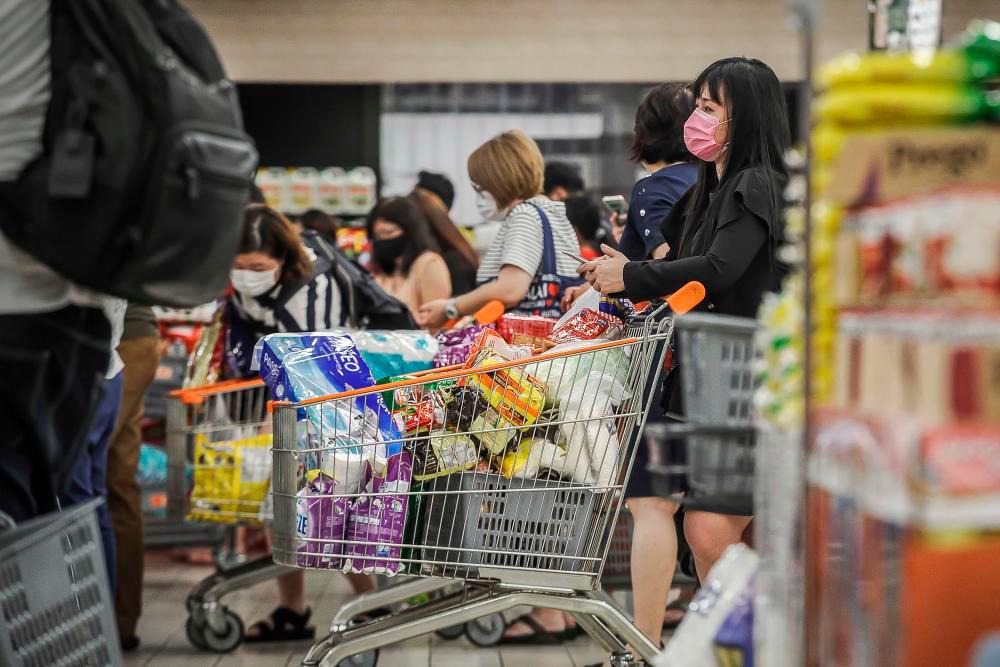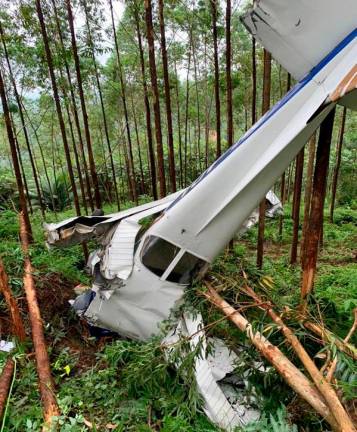THE continuous rise in food price inflation not only affects the purchasing power and income of the increasingly squeezed M40 and perennially struggling B40, which materially and adversely impacts household and private sector spending at a time when we are supposed to be in the endemic phase (i.e., steadily recovering from the economic impact of the lockdowns), but also exacerbates our food security problem.
Increasing food price inflation entails and means that households and private sectors would need to increase savings to cope with expected or anticipated future shocks in a global environment fraught with uncertainty and externally-driven inter-related dynamics that are increasingly complex.
This analysis makes for a grim reading, especially in the form of a precarious economic and financial situation of over-leveraged households and private sector, where the trade off in the holdings of financial assets between the banks (creditors) and borrowers (debtors) becomes apparent.
If the private sector on the whole wishes to save and accumulate more savings (as in liquid assets), then an increase in interest rates (via the overnight policy rate or OPR) negates the desire (by eating into disposal income) although beneficial to banks in the form of de-compressing the net interest margin.
On the contrary, lowering interest rates enables the household and private sector to save more although at the expense of the banks, which are already making huge profits anyway.
And with the minimum wage rate implementation of RM1,500 per month in place, producers who operate their farms might have to reduce the number of local workers employed in order to lower the operating cost.
Current difficulties in hiring foreign workers further complicates the labour shortage issue faced by producers.
A lower number of workers could lead to lower production levels and, by extension, lower supplies – thus resulting in price hikes.
Although we no longer experience the roadblock measures and limitations of market operating hours such as during the various lockdowns, supply-side and supply-chain disruptions persists externally – not least due to lockdown measures in major ports such as Shanghai and its domestic counterparts, causing logistical congestion.
All of these contribute to the inflationary momentum and pressures.
Notwithstanding, Malaysia is rich in natural resources, including fertile land for agriculture.
However, over-reliance on imported food, especially non-rice agrofood, has put our self-sufficiency ratio (SSR) on a downward and shrinking trend.
The Department of Statistics Malaysia’s Supply and Utilisation Accounts Selected Agricultural Commodities 2016-2020 indicated that lockdown measures resulted in lesser food items recording SSRs of more than 100% in 2020.
Only 19 food items recorded over 100% of SSR in 2020, compared with 25 in 2019.
Among the food items that recorded less than 100% of SSR are mutton (9.6%), ginger (18.9%), mango (20.2%), beef (22.2%), chilli (30.9%), round cabbage (37.5%), fresh milk (65%), rice (63%), coconut (66.6%), sweet potato (75.6%) and sardine (80.7%).
In 2020, Malaysia imported RM55.5 billion in food products, compared with RM33.8 billion of exports, translating to a large deficit of RM21.7 billion.
Such a trend is worrying as over the last decade, food imports in Malaysia have accumulated to RM482.8 billion while exports amounted to RM296 billion.
Climate change, which has resulted in unprecedented downpours, e.g, on Dec 17, 2021, have led to states such as Kelantan, Terengganu, Pahang, Perak, Negeri Sembilan, Malacca, Kuala Lumpur and Selangor experiencing severe flooding.
Around 5,000 livestock breeders and farmers were affected, causing nearly RM67.72 million in losses from the agro-food sector.
The latest Global Food Security Index 2021 from the Economist Intelligence Unit showed that Malaysia ranked 39th, which is far behind the UK (3rd), Finland (4th), Netherlands (6th), Japan (8th), United States (9th), Singapore (15th), Qatar (24th) and Kuwait (30th), as examples.
Despite Malaysia recording a slight improvement from the overall score of 68 in 2020 to 70.1 in 2021, the country scored “availability” and “natural resources and resilience” dimensions poorly at 64 and 46.6, respectively.
For the remaining two dimensions, namely “affordability” and “quality and safety”, Malaysia scored 85.6 and 76.3, respectively.
These indicators point to Malaysia’s long-standing structural problems in terms of import dependency and balance of payments (BOP) deficit for food items.
With the ongoing Russia-Ukraine conflict coupled with a currency that has been on the depreciating side, our BOP deficit continues to be aggravated by markups from the cost-push inflation that in turn worsens the cost of doing business and cost of living.
According to the United Nations Comtrade database on international trade, Russia is the third top trading partner of Malaysia for the import of “mineral or chemical fertilisers, phosphatic” at US$4.77 million, with a share of 16.2%.
Western sanctions on Russia have led to a shortage of fertilisers worldwide, thus increasing the cost of animal feed and crops in Malaysia.
Subsequently, local livestock breeders and farmers have to charge retailers/consumers higher selling prices to compensate for the rising cost of feeding ingredients such as corn, soybeans and wheat aside from the minimum wage increment of RM300 per month per employee starting May 1.
To deal with the ongoing food price inflation effectively, EMIR Research would like to call for a thorough review of the existing food security-related policies.
Here are some of the policy recommendations for the government to consider:
1. The Agriculture and Food Industry Ministry (Mafi) together with the Malaysian Agricultural Research and Development Institute, Federal Agricultural Marketing Agency, Area Farmers’ Organisation (Pertubuhan Peladang Kawasan), private sector and non-governmental organisations (NGO) to incentivise quality investments in the agricultural sector.
There must be stronger strategic collaboration and joint-ventures between the government, private sector and NGO to promote and enhance our food security.
The stakeholders could generate ideas and solutions on how to improve sustainable farming practices, enhance crop resilience against climate change and diseases, as well as yield enhancement. These measures would safeguard food prices against future shocks, reducing the risk of the cost of living being amplified in the long run.
2. Empower small-scale farmers – through tax incentives and generous credit (concessional or soft loans, e.g, at zero-interest rate) and grants (e.g, matching ringgit to ringgit) to improve their soil through modern technologies application like the Internet of things, Big Data and artificial intelligence aside from specialised agricultural training courses covering the aspects of soil management, climate change, pest management and water management.
Healthy soil is critical to improving biodiversity, quality of food produced as well as the life of farmers.
A consortium of banks together with development financial institutions such as SME Development Bank Malaysia Berhad and Bank Pertanian Malaysia Berhad, with Mafi as lead or key shareholder (e.g, “golden share”), should be formed to be specifically geared towards funding smart farming with the aim of food security.
3. Encourage intercropping of oil palm with banana, cassava and pineapple, etc. within existing plantations. It would reduce fertiliser and herbicide usage besides diversifying the country’s agricultural plantations dominated by palm oil, rubber and cocoa.
4. Mafi, the Entrepreneur Development and Cooperatives Ministry and Youth and Sports Ministry could craft training programmes and develop financial incentives targeted at youth involvement in the agricultural sector which is only 240,000 or 15% of total farmers in Malaysia. The cross-ministerial effort would be helpful in attracting the younger generation of agropreneurs to get involved in the agricultural sector.
5. Limit the issuance of Approved Permits for imported products to certain categories only, e.g, food items that have high SSRs. In other words, liberalise our import system for food to ensure a level playing field and to tackle monopolies and oligopolies that add to the cost of doing business and cost of living.
6. Expand domestic production of organic fertilisers and feedstock by applying oil palm biomass and waste such as fronds, leaves and kernel meal.
7. Utilise idle land and abandoned buildings to grow various kinds of food crops, which is made possible by rapid development in agritech such as hydroponic, indoor and vertical farming. Converting empty spaces into farms would encourage local food production and reduce greenhouse gas emissions.
We should adopt Singapore’s approach to food security: Increasing the ratio of food supplied by 2030 via urban farming, including growing vegetables on embankments of canals and also on floating rafts as part of flood management, etc, and integrating agriculture with aquaculture.
Focusing on high-quality vegetables, fruits, animal proteins and fish farmed locally would generate higher value-added activities and create a positive spillover effect along the food supply chain.
Our vision of food security should be based on creating interconnected food chains within the ecosystem, ensuring every Malaysian is able to afford high-quality food and enjoy sufficient nutritious food intake on a daily basis.
Amanda Yeo is a research analyst at EMIR Research, an independent think tank focused on strategic policy recommendations based on rigorous research. Comments: letters@thesundaily.com











